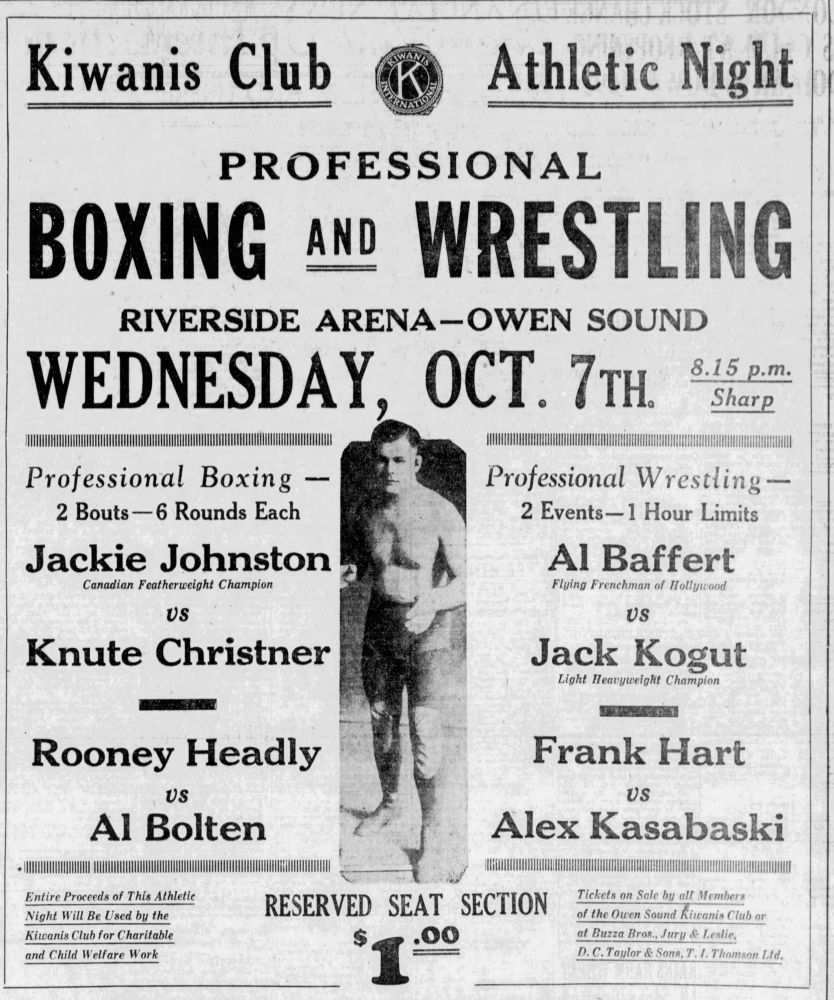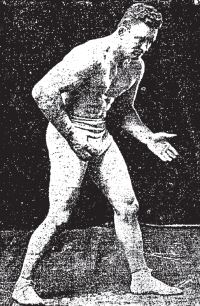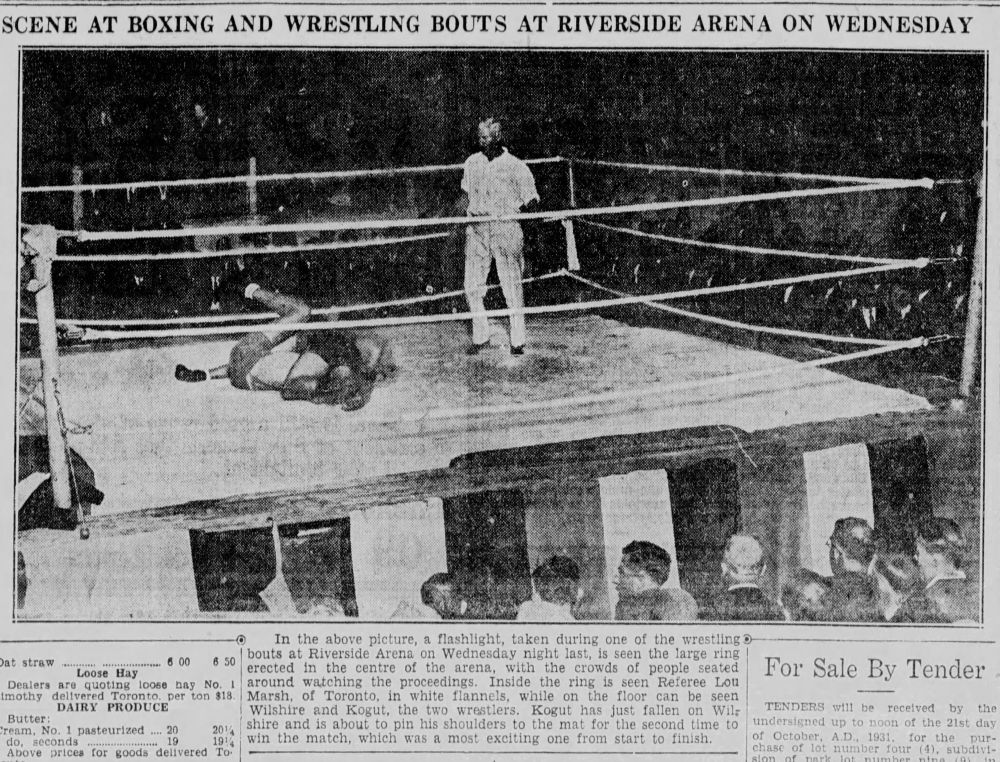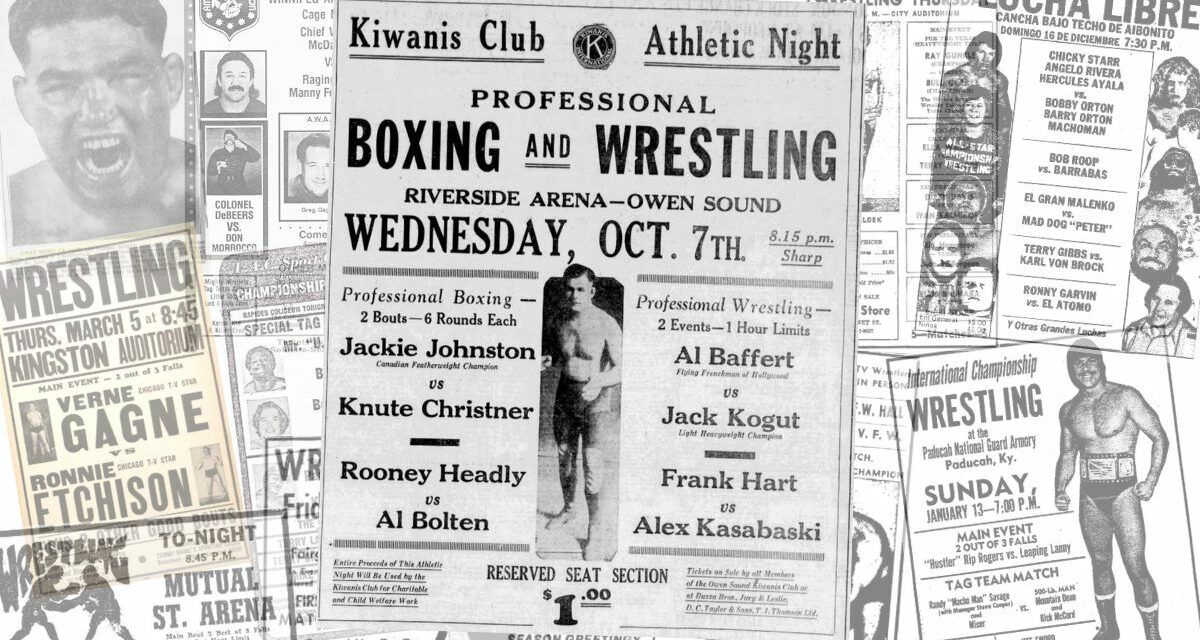The news on September 15 that Metroland was shutting down its weekly newspapers in Ontario probably barely registered on your radar. That is, of course, part of the reason they have been closed, the parent company — which also owns the Toronto Star, Hamilton Spectator and a handful of dailies still in print — pleading bankruptcy, citing lack of advertising dollars.
But this isn’t a column lamenting the death of the daily newspaper, where we once lived in a world where everyone got the paper and knew a little about a lot of things in their community, their country, their world, to where we are today, where someone chooses what they want to learn a lot about and ignores everything else.
The small-town newspaper was on my mind, though, as I dug up the very first professional wrestling show ever held in Owen Sound, Ontario.

The first card in Owen Sound, Ontario, on October 7, 1931.
Wednesday, October 7, 1931
Owen Sound, Ontario * Riverside Arena
Jack Kogut beat Al Wiltshire in two out of three falls
Frank Hart drew with Alex Kasaboski, each taking a fall in 60 minutes (special referee Lou Marsh)
Plus boxing
The local newspaper there, The Sun Times, dates back to 1853, the Sun and Times merging in 1918; it’s owned by Postmedia now (former boss of SlamWrestling.net). Alas, it’s not even a daily any longer, publishing three days a week now.
But holy cow, how could you not be in awe of this amazing lead paragraph reporting on the debut show, which ran in the sports section?
“Legalized murder” made its debut in Owen Sound on Wednesday evening when two fast, furious and decidedly rough wrestling bouts were staged at the Arena, under the auspices of the Kiwanis Club. The proceeds went to charity but that was about the only civilized feature of the show, as far as the wrestling was concerned. With nothing barred, except hitting with the closed fists, the wrestlers had the crowd in an uproar.
Yet then we find that on the front page — of the same newspaper — that someone actually died at the matches, suffering a heart attack, and the lead looks pretty classless in retrospect.
Owen Sound is a small town on the shores of Georgian Bay, which part of Lake Huron, one of the Great Lakes. With good traffic (was that an issue in 1931?), it’s a little less than three hours northwest from Toronto. Despite the Depression, wrestling was hot in Toronto, promoted by Jack Corcoran, under the auspices of his Queensbury Athletic Club, and it would change more after Maple Leaf Gardens opened in November of 1931.

Jack Taylor
It’s not really a surprise that Owen Sound hadn’t hosted a pro wrestling show. There are very few results to be found around Ontario in the 1920s, of what we could call pro wrestling with any certainty. There are, however, a couple of shows in Walkerton, Ontario, in 1929, about an hour west of Owen Sound. Those were partly a case of Local Boy Makes Good, as the esteemed Jack Taylor, Canada’s first great pro wrestler, was from nearby. Ivan Michailoff, another Toronto promoter, put on those shows. Here are those results, and some notes from the newspaper:
Friday, July 5, 1929
Walkerton, Ontario * Walkerton Confederation Arena
Jack Taylor (“a native born Bruce County boy and British Wrestling Champion”) beat Ned McCarr (“Boston giant”) in two straight falls
Fred Grobmeyer drew with F. Altman
“This is one of the first attempts at staging this line of sport in this district”
Friday, July 26, 1929
Walkerton, Ontario * Walkerton Confederation Arena
Jack Taylor drew with “Stazeake” (probably original Stan Stasiak) each taking a fall in 60 minutes
Sammy Hackett beat George Preston (boxing)
Thursday, November 14, 1929
Walkerton, Ontario * Walkerton Confederation Arena
Jack Taylor beat French Altman in two straight falls
Wladek Zbyszko beat Ned McCarr
But back to Owen Sound in 1931. As noted in the lead, the Kiwanis Club was the one hosting the card, and, as mentioned in the ad for the show, “Entire Proceeds of This Athletic Night Will Be Used by the Kiwanis Club for Charitable and Child Welfare Work.” (This trained journalist has no idea why things were Capitalized In that Fashion.)
Jumping ahead, cards in Owen Sound for the next couple of decades regularly featured a boxing bout, too, usually just a single one to complement two wrestling matches. Here in 1931, we have two of each, and I’ll be skipping the boxing side of the affair.
Frank Hart was usually billed as Frankie Hart, and though he was no relation to the famed Hart Family of Alberta, he carved out a good career, as did his son, Bobby. For more on both of them, read Gary Howard’s great 2010 piece: Father and son wore Hart name proudly.
“Pitiless Pole” Alex Kasaboski is the older brother of famed northern Ontario promoter/wrestler Larry Kasaboski. Alex wrestled from the 1930s right up until 1950. He died in 1952 at age 41 from blood clots in his lungs — he had taken a kick to the chest wrestling against doctor’s orders and died three days later. Alex began his career in Toronto and later set up shop in California. Larry and Alex were briefly a tag team, but it was as a promoter that Larry really made a name for himself. Northland Wrestling Enterprises is legendary for the summer tours, where the wrestlers loved hunting and fishing to balance off the drives to shows. Again, Gary Howard is the man when it comes to the Kasaboskis, as the author of the hugely unappreciated The Rassler from Renfrew: Larry Kasaboski and the Northland Wrestling Enterprises, which came out in 2008.
Whereas I had lots on Kasaboski, Al Wiltshire is somewhat of a mystery. He seemingly replaced Al Baffert — who was well known — on the card at the last minute and appears in none of the advance publicity … and I can’t seem to dig up any other matches with him anywhere.
Wiltshire’s opponent, though, Jack Kogut, is a known quantity. Never a big man — 5-foot-11 or so, less than 200 pounds, the Chicagoan worked a ton of places, roughly 1926-1946. “Kogut, grown all the way up to 198 pounds now, can be depended to apply everything but the ring posts to the business at hand,” reads some advance publicity for Dayton, Ohio, in 1933. For whatever reason, he was adopted by Canada, promoted at various times from Toronto and Montreal, and was nicknamed the “Canadian Sonnenberg” for his dropkicks. We’re pretty sure the ties to the Great White North have something to do with a child, as in 1934, he was brought to court in Toronto, appearing in domestic relations court, and charged with non-support. Corcoran stepped up with the $1,000 bail money. Kogut repaid the loyalty in January 1935, when Corcoran was dragged in front of the Ontario Athletic Commission over a payment made to provincial politician Thomas A. Murphy. Kogut had apparently driven Corcoran to the place the payment was made and could not verify what had been handed over, weakening the case against Corcoran. Peter Paul (Jack) Kogut died in 1972.

Jack Kogut, 1931.
Corcoran didn’t exactly have the top, top names available in 1931 for this spot show in Owen Sound — though they’d be back on Monday, November 9, 1931, but at the Savoy Theatre — he did have probably the top sportswriter of the day as the guest referee. Whether a sportswriter or a referee is a draw at all is up to personal taste, I guess, but man, personally, I’d have loved to sit down with Lou Marsh, who called the Toronto Star home for a long time.
Born in 1879, Marsh started writing at the Star in 1892 and was able to see some of the greats of the time: marathoner Tom Longboat; the amazing Edmonton Grads women’s basketball team; sprinter Percy Williams; and so many greats in hockey and football. He definitely did more than just write, serving his country in World War I and serving briefly in France. He also was an NHL referee, a boxing referee, and was an official at the 1932 Olympics in Los Angeles.
Marsh was not, however, a big fan of pro wrestling, though he’d done some refereeing previously.
The Sun-Times noted that Kiwanis reps Frank Sinter and Frank Smith went to Toronto to sign up Marsh:
After a lengthy conference with Promoter Corcoran, the telephone was brought into action, in an effort to have the most colorful and efficient sports referee in Canada to act — LOU MARSH — breezy sports writer of the “Star” and recognized as one of the most capable officials on the continent, a man who has refereed in several world’s title bouts, and one man who calls them as he seems them.
The same piece noted that Marsh wasn’t into wrestling:
The average fan will no doubt wonder why Lou hesitated to act in the capacity of arbiter for wrestling. The story behind it is that some way or other he has never found a warm spot in his heart for the “tackle and toss ’em” game, in fact he has been offered as high as five hundred dollars to referee a grappling match in Toronto, and has always turned it down, despite the influence of many well known Canadians. So the appointment here is looked upon as a “big scoop,” in view of the fact that this is the first time that Lou has ever refereed an important wrestling match. “Now isn’t this an indication of the magnitude of the program!”
It was Marsh as the referee that made it into the newspaper on Saturday, October 10 — photography not being what it would become.

Lou Marsh in the ring in Owen Sound in 1931.
Most know Marsh from the Lou Marsh Award, which was presented to the top Canadian athlete annually from 1936 until 2022 when it was renamed the Northern Star Award over concerns about Marsh’s dated, racist language in past stories.
Now for that death.
It was front-page news in the Owen Sound, with an all-caps headline and three decks:
DIES WHILE WITNESSING WRESTLING
Mr. John Wesley Follis Succumbs at Sports Meet
HEART TROUBLE
Excitement of Wrestling Match Brings on Man’s Death
According to the story, Follis “passed away just about the end of the second fall of the Hart-Kasaboski bout,” and while two doctors were able to treat him quickly, he had already died. In his 70th year, he had been apparently in poor health.
What I love about these card exams is what I love about newspapers (and for the record, October 7 is the last day of National Newspaper Week 2023). They represent a moment in time, a moment that only happened once. I’m thankful to the men — and mostly men — and women who documented these events back in the day, and wish only the best to those out there still toiling away. Ink-stained wretches may have been a dismissive term back in the day since the newspapers were truly laid out with lead letters and stamped onto newsprint, but to me, it’ll always be a term of endearment.
RELATED LINK


Great article. Could Ned McCarr be Ned McGuire, given the Boston claim?
Sure, it’s possible, but tough to prove.